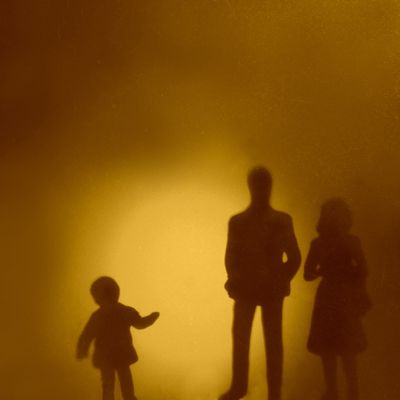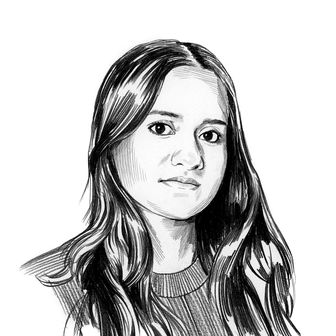
In the aftermath of Roe, many conservatives keep pushing their belief that people who are denied abortions can simply put their children up for adoption, from justices framing safe-haven laws as a solution to abortion bans to forced birthers carrying signs offering to adopt babies at protests. But Alma, who is 33 years old and lives in Tennessee, has seen firsthand just how difficult the reality of adoption can be. As a baby, Alma was privately adopted through a Christian agency by parents who claimed to be “pro-life.” Alma told us about their fears that, without Roe, more children will be forced into situations like theirs.
Growing up in a red state with pro-life, Christian parents, you grow up being anti-abortion. As early as I can remember, my family would go to church on Sundays to put out crosses and hold up anti-abortion signs. I was 4 or 5 and holding up signs that said, I’m adopted. Would you have aborted me?
Abortion was never an option for my birth mother. She was indoctrinated into the same right-wing Christianity I grew up in. Her parents wouldn’t have allowed it, even though she was 18 and wasn’t married to my birth father, and she wouldn’t have considered it. I was privately adopted through a Christian agency, one of those crisis pregnancy centers that preys on vulnerable pregnant women and makes them think there is no option except adoption.
When I was 9 or 10, my adoptive parents told me, “Your birth mom made a mistake. Then she got pregnant and she couldn’t keep you.” It’s very common in religious circles for people to say that. Getting pregnant out of wedlock is considered a huge mistake, so you grow up thinking you’re a mistake. People don’t really leave any other choice for you to think anything else.
I didn’t understand the full circumstances of my adoption until I was 15 and had sex ed at school. That’s when I put it together myself. That was also when I stopped holding up signs at church. In ninth grade I had sex and got pregnant and miscarried. People in our church found out and ostracized me and my family. The same churchgoers who said “Reach out to those in need” did the complete opposite to us. I stopped going, but I still believed, because I was terrified of going to hell.
Abortion is a touchy topic for Christians. Until recently I still believed there should be at least some ban. Then I came across a YouTube video on bodily autonomy that changed my views completely. If someone no longer wants to be pregnant, that’s their choice, period. People on the right will say abortion is murder. Is it murder if you don’t donate a kidney, you know someone needs it, and they die? Fetuses are not entitled to anybody’s body, even for survival, just like the rest of us aren’t entitled to anybody’s body.
Adoption comes with unique traumas. Both my siblings were also adopted and we all struggled at points. There’s this sense of not belonging and not knowing where you came from. It’s a loss and it comes with a lot of grief. Your adoption is a huge part of your identity, whether it’s made so by your family and peers or just your own curiosity. Those of us who haven’t processed the trauma still have problems to this day, and we don’t give adoptees the mental-health resources they need. Many therapists don’t know what to do with adoption grief unless it’s their niche.
I did seek out a relationship with my biological mom, whom I met when I was 16. Because it was a private adoption, the agency had to ask her if she was okay with it, and fortunately she was. I ended up meeting her whole family. It was wild and weird. I look a lot like her, like all of them — you can definitely see what’s nature and what’s nurture. I asked her, “Why did you give me up?” She said, “I was 18, I couldn’t have provided for you.” You hear that a lot from people who have met their bio moms: that they weren’t in a place to financially support you, they were single, etc. At the time, I couldn’t process it because of how I’d been raised to think about abortion and fetuses and pregnancy. I thought, How can this person just go through nine months, push out this whole baby, and let it go? That really messes with you.
Now, it highlights for me how hard we make it for single parents to survive in this world. It makes my blood boil when I see people frame adoption as an alternative to abortion. A lot of the time parents adopt for themselves, because they want kids, but many people in Christian environments don’t ask themselves why they want them — you’re just expected to marry young and have them, and if you can’t have them, it’s a trial given to you from God and you resort to adoption. But we’re not a backup. So many people on the right who say either “We’ll adopt your baby” or “You can put your baby up for adoption” see adopted kids as second-class kids. A lot of people on the right see kids as property without agency, and it’s worse when you’re adopted because they think they did you a favor. My dad and his mother, my adoptive grandmother, constantly made me feel I should be more grateful to them, like I could have been in a worse situation if I hadn’t been adopted, which felt like gaslighting.
I’m angry and heartbroken about Roe being overturned, and fear it’s going to be used as a way to put more kids into the adoption or the foster system. When I share my views about adoption, so many people are like, “Would you rather have been aborted then?” And I tell them, for the last time, adoption is not the alternative to abortion. It’s forced birth. And I was a forced birth. But even if I had been aborted, if that meant my bio mom had a choice, I’d be fine with that. I’d be none the wiser. It would have been her choice. It pisses me off that she wasn’t given one.


